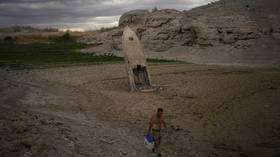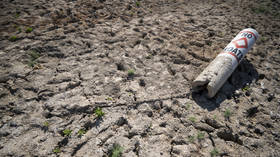Western US faces water cuts

With parts of the US Southwest suffering their worst drought conditions in more than a millennium, the federal government has ordered reductions in Colorado River water allotments to the states of Arizona and Nevada, as well as to Mexico.
The water cuts will begin in January and will hit Arizona the hardest, reducing its Colorado River allotment by 21%, or 592,000 acre-feet, the US Department of the Interior (DOI) announced on Tuesday. Nevada faces an 8% cut, or 25,000 acre-feet, while water flows to the south of the US-Mexico border will be reduced by 7%, or 104,000 acre-feet. California, which draws more than one-third of the river’s water, won’t see any cut to the 4.4 million acre-feet of water that it receives annually.
The announcement comes one year after the federal government declared an unprecedented water shortage in Lake Mead and the Lower Colorado River Basin, portending supply cuts. A Colorado River compact signed in 1922 governs water management affecting seven states – California, Arizona, Nevada, Colorado, New Mexico, Utah and Wyoming – and Mexico.
Water levels in Lake Mead, which was created when the Hoover Dam was built on the Nevada-Arizona border to dam the Colorado River in the 1930s, are projected by January to fall to a record low of 1,047 feet, meeting the DOI’s standard for a Tier 2 shortage. The massive lake, which helps supply water to more than 25 million Americans, was down to just 27% of its capacity as of last month, compared with 37% a year ago.
A study released earlier this year by the National Climate Change journal found that the US Southwest has suffered its driest 22-year period in at least 1,200 years. Lake Mead is fed by the Colorado River, and its supplies are strained by overuse even under normal weather conditions. Arizona and Nevada rank number two and three, respectively, among the fastest-growing US states.
“Every sector in every state has a responsibility to ensure that water is used with maximum efficiency,” said Tanya Trujillo, assistant US secretary for water and science. “In order to avoid a catastrophic collapse of the Colorado River system and a future of uncertainty and conflict, water use in the basin must be reduced.”













